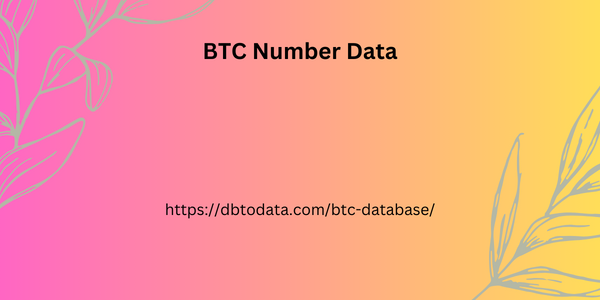Post by account_disabled on Mar 6, 2024 6:18:56 GMT
The money changer is nothing more than a parallel exchange operator, who is not authorized to carry out such activity and still trades foreign currencies outside the official financial transaction system. Negotiations are usually made in dollars or any other currency. However, all exchange transactions must be carried out through official banking institutions or agents authorized by the Central Bank, under penalty of committing a crime.
It is important to technically analyze how a money changer will be held responsible in a police investigation and possible criminal action to be initiated both in crimes and money laundering schemes, within Brazilian territory — which BTC Number Data will then be judged by state justice — and transnational crimes — judged by justice Brazilian federal government —, which involve financial transactions abroad destined for tax havens, with the aim of laundering money originating from a previous criminal activity (preceding crime), often in a scenario of international drug trafficking.
reproductionreproduction
Sanctions for money changer activity are provided for in article of Law /, the Law on Crimes against the Financial System, which expressly punishes exchange operations not authorized by the BC with a penalty of one to four years in prison and traffic ticket. In this criminal article, the act of “doing” or “operating” without due authorization or with authorization obtained through a false (vetoed) declaration, financial institution, including the distribution of securities or exchange.

The money changer often carries out dollar-to-dollar operations and can be accused of money laundering and currency evasion. In this operating model, a person called “X” transfers money abroad without due communication to the Central Bank to a money changer “Y”, and this money changer “Y”, through a company “Z” abroad, transfers the money for person “X” owner of the source money who purchases real estate, aircraft and other assets, in his own name, for example, in bank accounts in tax haven countries (which have reduced tax charges and obligations for individuals or legal entities and for your internal or external financial transactions), the famous offshore companies, or even in the name of “orange” third parties. They can also often bring the money back to the country of origin, with the amounts cleaned and “laundered” through fictitious financial transactions.
There is a current in the Judiciary that understands that it is a supra-legal reason for excluding the illegality of the money changer, when three situations accepted by doctrine and jurisprudence occur, namely: consent of the offended party, insignificance and social adequacy. It is important to remember that, for there to be criminal proceedings against someone due to the crimes foreseen and punished in the Law on Crimes against the Financial System, the values of the transactions must be greater than R$ thousand — the value used as a limit by the Financial Activities Control Council (Coaf), Federal Revenue and Federal Justice. It is worth highlighting that there are loopholes in the law that favor the thesis of social acceptance of the money changer, depending on the individualization of his conduct in each specific case.
It is important to technically analyze how a money changer will be held responsible in a police investigation and possible criminal action to be initiated both in crimes and money laundering schemes, within Brazilian territory — which BTC Number Data will then be judged by state justice — and transnational crimes — judged by justice Brazilian federal government —, which involve financial transactions abroad destined for tax havens, with the aim of laundering money originating from a previous criminal activity (preceding crime), often in a scenario of international drug trafficking.
reproductionreproduction
Sanctions for money changer activity are provided for in article of Law /, the Law on Crimes against the Financial System, which expressly punishes exchange operations not authorized by the BC with a penalty of one to four years in prison and traffic ticket. In this criminal article, the act of “doing” or “operating” without due authorization or with authorization obtained through a false (vetoed) declaration, financial institution, including the distribution of securities or exchange.

The money changer often carries out dollar-to-dollar operations and can be accused of money laundering and currency evasion. In this operating model, a person called “X” transfers money abroad without due communication to the Central Bank to a money changer “Y”, and this money changer “Y”, through a company “Z” abroad, transfers the money for person “X” owner of the source money who purchases real estate, aircraft and other assets, in his own name, for example, in bank accounts in tax haven countries (which have reduced tax charges and obligations for individuals or legal entities and for your internal or external financial transactions), the famous offshore companies, or even in the name of “orange” third parties. They can also often bring the money back to the country of origin, with the amounts cleaned and “laundered” through fictitious financial transactions.
There is a current in the Judiciary that understands that it is a supra-legal reason for excluding the illegality of the money changer, when three situations accepted by doctrine and jurisprudence occur, namely: consent of the offended party, insignificance and social adequacy. It is important to remember that, for there to be criminal proceedings against someone due to the crimes foreseen and punished in the Law on Crimes against the Financial System, the values of the transactions must be greater than R$ thousand — the value used as a limit by the Financial Activities Control Council (Coaf), Federal Revenue and Federal Justice. It is worth highlighting that there are loopholes in the law that favor the thesis of social acceptance of the money changer, depending on the individualization of his conduct in each specific case.
